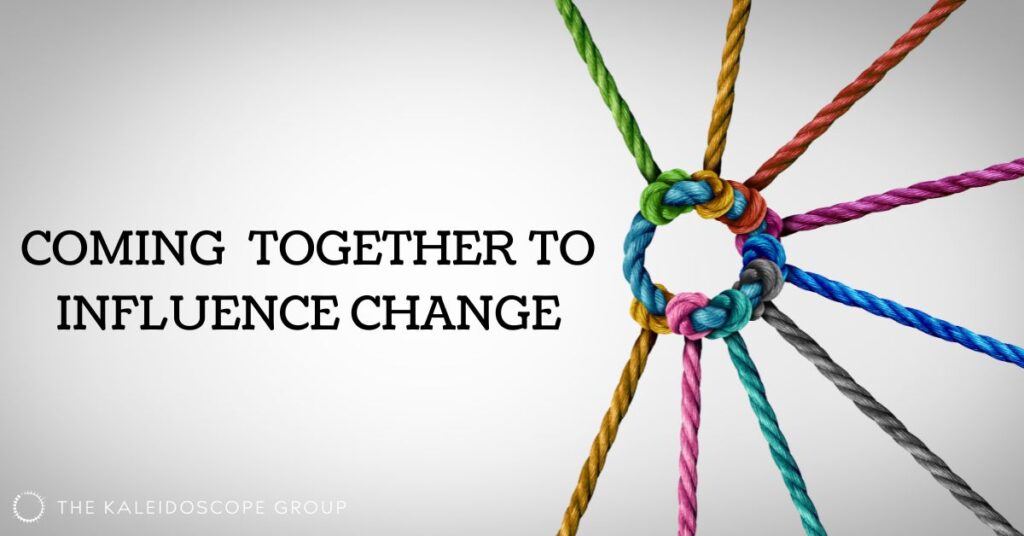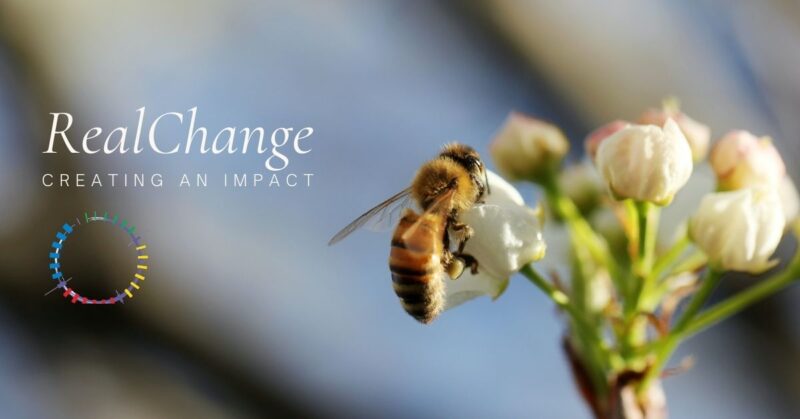Coming Together to Influence Change
August 9, 2022

In the third of a series of articles on designing for behavior change and habit adoption to create robust DEI habits in your organization, Hanlie van Wyk explores one of the most influential drivers of change.
Hanlie van Wyk is a social scientist, global engagement leader and subject matter expert at The Kaleidoscope Group’s Global Practice.
In previous articles, Hanlie shared how four contexts – self, social, systems, and spaces – require activation to enable changes in behavior and more importantly create the conditions for habit formation. We looked at the formula for behavior change and discovered how to empower the first context: the self. This is the third in my series of articles in which we will consider arguably the most powerful context: social.
How might we rethink our social norms or provide support to make change easier for people, provide social proof or support in a way that compels others to act? Then how could we remove or overcome social barriers or group norms and adjust our social rituals or groups to remove the distraction and temptation of unhelpful behaviors?
Enhance Social Facilitation
According to some theories of behavior change, people are more likely to engage in inclusive behaviors if they:
- Have information about and hold beliefs consistent with the behavior
- Develop self-regulation abilities to change their behaviors
- If they experience social facilitation
Social facilitation refers to people’s tendency to show an increased level of effort because of the real, imagined, or implied presence of others. It positively influences and supports people participating in new recommended behaviors. For example: if you know your superiors, colleagues, or peers at work care openly about inclusivity and you happen to be part of a diverse team, you may be more likely to practice inclusive behaviors. Often even the feeling that your behaviors are noticed will encourage helpful, and discourage unhelpful behaviors.
Social facilitation includes the concepts of social influence, social support, a negotiated collaboration between individuals and families, and professionals.
Extend Your Influence
An individual’s attitudes, beliefs, and subsequent actions or behaviors are influenced by others who serve as models for our choices. Positive social influences sway our interest and willingness just as positive relationships help to support and sustain change.
This happens in three ways:
- Accepting approval and/or rewards when we comply
- Building and/or strengthening relationships through identification around similar beliefs
- Incorporate it as part of your values or internalization.
How does this apply to long-term behavior in the workplace? In an immature organization, you may find people initially complying with DEI ideas and plans to be accepted or rewarded. This is not ideal for long-term behavior change but meets people where they are in the short term. Rewarding people for inclusive behaviors is a form of external motivation. In the world of behavior change, this tends to be effective for about 3 months – at most. It is a great opportunity to use this time to increase knowledge and have a conversation about the importance of DEI but be warned. If the motivators do not shift from external to internal during this time the behaviors are unlikely to sustain for long enough to become a habit. The expectation will be to receive more and more rewards and accolades for behaviors that should – over time – be internally motivated. Therefore, a drop-off in erroneously motivated behaviors can be expected. The opposite of what we hope to achieve in DEI.
As the organization or team matures, you may discover some shared beliefs that lead to relationship building and groups coming together. This is more conducive to long-term change and habit adoption. Ideally, you would like people to accept and internalize DEI values as part of the ‘way we do things here’ or what I call: culture.
Encourage Support and Collaboration
Research suggests that communities providing higher levels of social support have lower rates of unhelpful behaviors. In DEI this may include the language that you use, poor non-verbal communication, inattentive listening, not checking your facts, creating division and cliques, or not speaking up when people are excluded.
Social support is also implicated in the processes of social control. Effective social control is based on social support. Supportive societies and supportive relationships, respectively, can lessen unhelpful behaviors. For example, BRGs or ERGs can play a critical role in the context of society by offering social support and ensuring collaboration around certain DEI dimensions and topics. A research project of 400 organizations found that high-performance companies also leverage ERGs for “strategic leadership development incubators” as well as DEI initiatives.
What does this all mean for leaders striving to create more equitable and inclusive workplaces?
Pay attention to your team’s behaviors and appreciate or acknowledge inclusive behaviors. Support them by offering experiential and transformative training rather than a check-the-box exercise. As a leader one of the best practices for ERGs is to sponsor groups, so they have the support needed to succeed. Finally, be present, transparent, and create the environment – what I like to call Set and Setting – for DEI behaviors to be practiced in a safe space. More about this in my next article!


